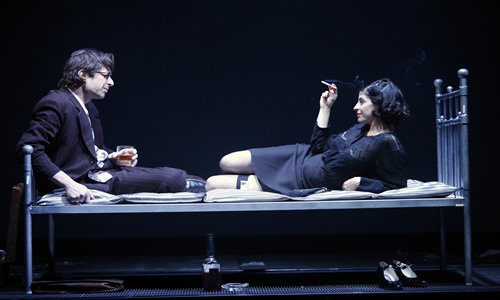Humor within horror

Stories about the Holocaust are invariably grave, yet late Jewish-American author Isaac Bashevis Singer, who won the 1978 Nobel Prize in Literature, managed to tastefully and comically handle the serious subject with respect. It is the challenge of striking this unique balance that inspired Israeli dramatist, Yevgeny Arye, to adapt three of Singer's novels onstage.
Following successful adaptations of Singer's The Slave (1962) and Shosha (1978), Arye, founder and artistic director of the Gesher Theater in Tel Aviv, again paid homage to the author in 2008 by bringing to the stage Enemies, a Love Story (1966), which follows the lives of Jewish Holocaust survivors in the US.
After opening the International Festival: Splendid Europe at the National Theater of China (NTC) on Wednesday, the play will be staged twice more at the theater next week together with eight other plays to be shown during the month-long festival.
Set in New York City in the late 1940s, Herman Broder, a Polish Jew, survives the Holocaust with help from his family's servant, Yadwiga. Believing his wife to be dead, Broder marries the servant and settles down in his new life.
Meanwhile, Broder has an affair with another Polish immigrant, Masha, and weds her after his marriage to Yadwiga is deemed illegitimate because of his religion. Despite posing as a book salesman to both of his wives, he is in fact a ghost writer to a corrupt rabbi and therefore his life is full of deceit and lies.
Like many Holocaust survivors who endured losing their families, Broder is constantly haunted by Nazi-filled nightmares. His life takes a dramatic turn, however, when he discovers his first wife, Tamara, actually survived the Holocaust and is also living in New York City.
Broder reflects on his experience and realizes he must face the consequences brought on by his own lust.
"In this novel, everything takes place after the Holocaust, when over 6 million Jews perished. But it's not about death; it's about life after death and about the fate of those who miraculously survived and were condemned to go on, being chased by the ghosts of their past," Arye told Metro Beijing.
"Singer belongs to a very rare, unique generation of authors who remain grand without the fear of needing to be melodramatic," he said, after asked what inspired him to first adapt the play to the stage five years ago.
Arye adapted Enemies, a Love Story together with Israeli dramatist Roy Chen over a period of a year. One of the biggest challenges in adaptation was determining how to deal with the many shifting locations in the novel.
To make the theatrical version flow, some scenes had to be cut and others had to be added. Stage designer, Simon Pastuch, modeled the stage based on the New York City metro system - the idea being that, as Broder is constantly on the run, he is trampling through a kind of hell.
"Every new location is a metro station; an entrance to the next level of madness," Arye explained.
But for the director, the real challenge loomed in how to stay truthful to the novel and "keep the right proportion" of tragedy and comedy so the story "didn't lose its sense of humor and remained personal."
Adapted from the English translation of Singer's book, Chen also referred to the author's original Yiddish edition.
Despite garnering positive reviews upon its premiere in Israel, it was also criticized for its many comical lines and portrayal of sexual desire onstage.
"There is no drama without laughter, not just in life but also in theater," Arye explained.
When: 7:30 pm, October 24-25
Where: NTC, 277 Guang'anmenwai Dajie, Xicheng district
Tickets: 30-280 yuan
Contact: 400-610-3721